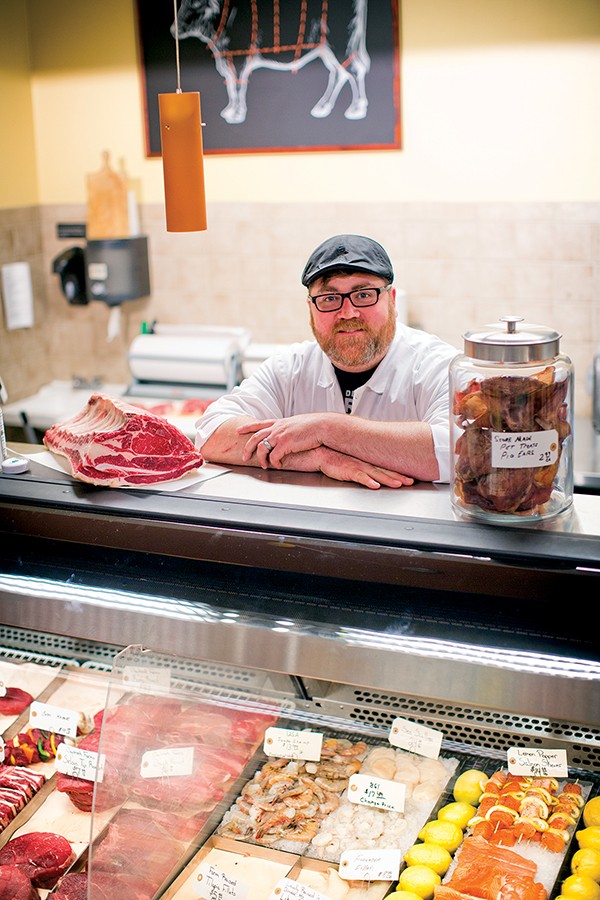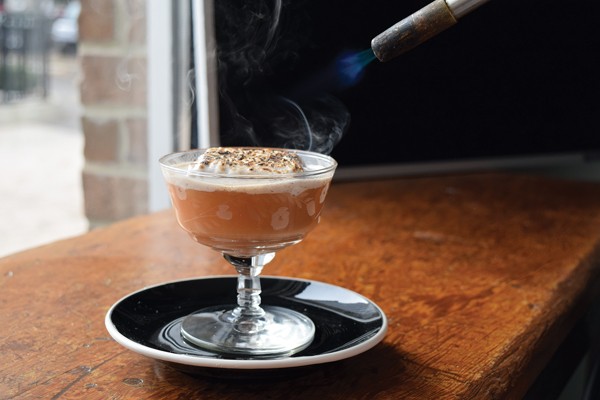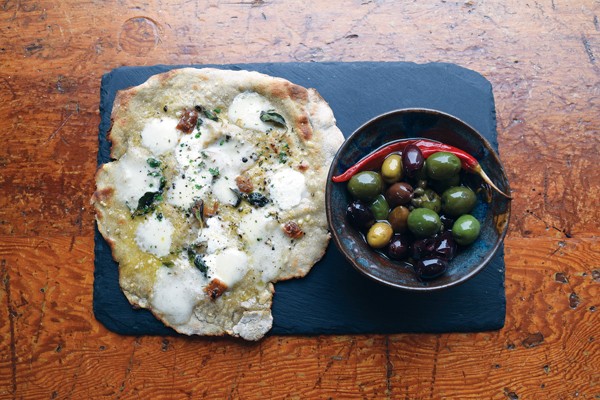Russell Smith, Miss Cordelia’s general manager, was impressed with the store’s history as a leader in the locally sourced food movement, but felt it had missed some key opportunities.
“Having a local meat source is something I was always interested in,” Smith says. “We had the equipment. It was just a question of figuring out how to shift from conventional beef and pork that comes in a box to bringing in sides of beef and whole hogs.”
To that end, Aaron Winters is one of Smith’s secret weapons in the campaign to enhance his store’s image. Winters has been charged with transforming the store’s meat counter into a craft butcher shop stocked entirely with locally sourced meat in addition to a range of house-made sausages, salumis, and smoked delicacies ranging from bacon to spicy tasso ham.
“With his background as a chef, Aaron’s been an awesome fit,” Smith says, describing the shift from buying primal cuts to sides of beef and whole hogs. “His cooking ability allows us to use all the animal — especially with hog because of the things you cure and things you smoke.”
“We only use farmers we know,” Winters says. He’s spent time working at Claybrook Farms, Newman, and Homeplace to determine whether or not the operations are truly sustainable. “I want to know the animals have had a happy life,” he says.
Even the humble ground beef at Miss Cordelia’s is currently being processed from a dry-aged cow. “So it’s not the yuck and the trim that’s been sitting in a bag for six months,” Winters says.
 Justin Fox Burks
Justin Fox Burks
Aaron Winters, Miss Cordelia’s secret (meat) weapon
It may not always be evident on grocery store shelves, but there’s so much more to a cow than ribeyes, strips, chuck roasts, and tenderloin. Winters’ array includes lesser-known cuts like the bavette, inside and outside skirts, and spider steaks — the stuff people don’t know because it usually ends up in grind. Similarly, Winters, who trained in Italy, breaks his pigs down in a more European fashion. Nothing goes to waste. Soup bones not being frozen and sold are roasted and turned into rich, house-made stocks. Smoked ham hocks, bacon, and maple breakfast sausage are available all the time.
“I love tasso,” says Winters, who’s made his own version of the South Louisiana delicacy a staple of Miss Cordelia’s meat counter. “People think of it as a super spicy, smoked little chunk of meat that they throw in greens or red beans. My method is a little bit different, so you can slice and put it on sandwiches without completely blowing your head off.”
Beer brats and sweet Italian sausages are kept in stock due to popular demand, but Winters is always making specialty flavors that rotate in and out and run the gamut from Cajun spice, to an Argentinian chorizo.
“I’m making head cheese, pork terrines, capicola, and chicken liver mousse pâté,” he says, announcing plans to add even more specialty items like house-made ham, finocchiona, and lardo di Colonnata.
Winters and Smith are working together to build synergy between Miss Cordelia’s meat counter and its deli. Although only a few items are currently available, a new sandwich menu is on the works. Future offerings will include a pressed Cuban sandwich with cured Cuban-style pork, sour orange, cilantro, peppers, house-made ham, and pickles.
“I want people to tell me what they want,” says Winters, who enjoys preparing custom sausages and other items for his customers.
“It’s an interesting challenge to make people forget what they think they know about us,” Smith says. “Fair or not, this store has always had a reputation for being expensive. What I’m learning, the longer I’m here, is that the thing we can’t compete on are conventional groceries. I can’t sell Cheerios the way Kroger sells Cheerios.
“But we can do stuff like this that just blows other groceries out of the water, and we can be very affordable about it.”
 John Klyce Minervini
John Klyce Minervini  John Klyce Minervini
John Klyce Minervini